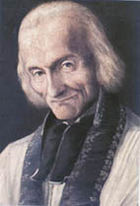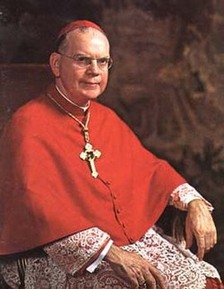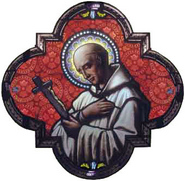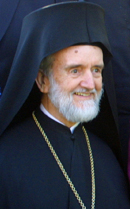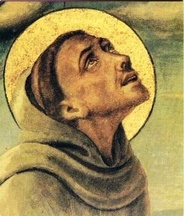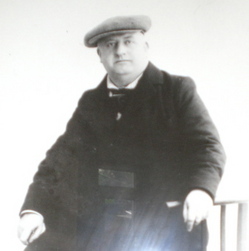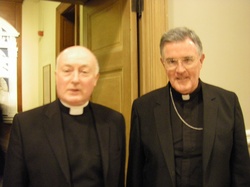 The life we lead is based on the influences we have. For some, like Father George Rutler, John Newman and John Vianney are two such influences. George Rutler, a priest of the Archdiocese of New York and pastor of the Church of Our Saviour (NYC) gave the Terrence Cardinal Cooke Theology Lecture tonight at Saint Joseph’s Seminary. Himself a convert, author, TV personality tried to dispel the florid presentations of the saint which detach reality from the soul. John Vianney (8 May 1786 – 4 August 1859) knew himself well as a farm boy who desired to serve the Lord as a priest in love. What ought to be resisted when thinking about Vianney is sugar coating his ministry and manner of living. His was not a life akin to pouring molasses on roast beef. The saint, in Catholic theology and as reminded by Rutler, is a person who shows us that living the gospel is possible, that conversion is possible, that real, self-giving love is possible because the saint shows us Christ. And since Christianity is not speculation but fact, the fact of the saint is a testament to the reality of Christ today.
The life we lead is based on the influences we have. For some, like Father George Rutler, John Newman and John Vianney are two such influences. George Rutler, a priest of the Archdiocese of New York and pastor of the Church of Our Saviour (NYC) gave the Terrence Cardinal Cooke Theology Lecture tonight at Saint Joseph’s Seminary. Himself a convert, author, TV personality tried to dispel the florid presentations of the saint which detach reality from the soul. John Vianney (8 May 1786 – 4 August 1859) knew himself well as a farm boy who desired to serve the Lord as a priest in love. What ought to be resisted when thinking about Vianney is sugar coating his ministry and manner of living. His was not a life akin to pouring molasses on roast beef. The saint, in Catholic theology and as reminded by Rutler, is a person who shows us that living the gospel is possible, that conversion is possible, that real, self-giving love is possible because the saint shows us Christ. And since Christianity is not speculation but fact, the fact of the saint is a testament to the reality of Christ today.
Month: October 2009
Cardinal Terrence Cooke: 26th anniv. of death
Twenty-six years ago today God called Terrence James
Cardinal Cooke, 62, to Himself. Under the motto of “Thy Will be Done” and at
the age of 47, he was nominated archbishop of New York, succeeding Cardinal
Spellman. The Cardinal lived his life in dedication to the Lord, often quiet
and formal. His cause for canonization was introduced in 1992 and named a
Servant of God by Pope John Paul II.
Almighty and eternal Father, we thank you
for the exemplary life and gentle kindness of your son and bishop, Terence
Cooke. If it be your gracious will, grant that the virtues of your servant may
be recognized and provide a lasting example for your people. We pray through
Our Lord Jesus Christ your son who lives and reigns with you and the Holy
Spirit, One God, for ever and ever. Amen.
Saint Bruno
Saint Mary Frances of the Five Wounds
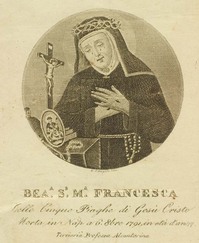 Lord God, You endowed the virgin Mary Frances with gifts from heaven. By imitating her goodness here on earth may we come to share her joy in heaven.
Lord God, You endowed the virgin Mary Frances with gifts from heaven. By imitating her goodness here on earth may we come to share her joy in heaven.
Speculation of East-West Reunion is too premature
Metropolitan
John Zizioulas of Pergamon sent a letter to the Archbishop of Greece and to all
Metropolitans of the Church of Greece reflecting on their acerbic and
uninformed opinion regarding theological dialogue with the See of Rome. Rigid adherence to one’s opinion is sinful. Metropolitan John is a consequential theologian and therefore I think his
insight matters. Clearly one gets the impression he distrusts imprudent public
speculation as to when and how a “reunion of the Orthodox and Catholic Churches”
is to take place. A too hopeful stance is unrealistic and does not account for
the continued dogmatic, ecclesiological differences yet to be resolved. One
wonders if the Catholic theologians and media people actually do their homework
or whether clichés is all they know. There is reason to believe we want to see partial reality.
Your Eminence,
Given that much turmoil has
been unduly created by certain circles, on the subject of the official
theological Dialogue between Orthodox and Roman Catholics, and that views have
also been expressed, which often range between inaccuracy and open falsehood
and slander, I am hereby addressing Your affection in order to clarify the
following:
1. The aforementioned theological Dialogue does not constitute a
concern of the Ecumenical Patriarchate, and much less, that of a specific
person, but is something that is taking place upon the decision of all the
autocephalous and autonomous Orthodox Churches without exception. Specifically
with regard to the present period of the Dialogue, during which the undersigned
has the co-chairmanship from the Orthodox side, the agreement of all the
Orthodox Churches for the continuation of the Dialogue has been recorded in
Memoranda signed by the venerable Primates of the Orthodox Churches, which are
hereto attached in photocopy. As Your Eminence will see when reading
these Memoranda, even the most holy Church of Greece – and in fact with a
Synodical decision – has admitted that “despite the existing difficulties,
which spring from the provocative activities of Unia to the detriment of the
flock of the Orthodox Church, the said Theological Dialogue must
continue.” Consequently, those opposed to the said theological
Dialogue are doubting and judging pan-Orthodox decisions, which have been
reached synodically. By claiming solely as their own the genuine conscience of
Orthodoxy, these people are in essence doubting the Orthodoxy not only of
certain persons – as they misguidedly insist – but of the very Primates and
sacred Synods of all the most holy Orthodox Churches.
2. The same things apply
in the case of the said Dialogue. We are informed that a certain
professor in his letter to the Reverend Hierarchs is censuring the topic of
primacy as a chosen topic for the theological Dialogue, and believes that the
Dialogue should be concerning itself with other matters. But the said
professor is either ignorant of, or indifferent to, the fact that – again – the
topic of the Dialogue was decided on at a pan-orthodox level. The attached
Memoranda, signed by all the Primates of the Orthodox Churches, testify to and
verify this. The most holy Church of Greece thus accepts that “this
discussion (regarding Unia) can, for the sake of facilitating the course of the
Dialogue, be conducted within the framework of ecclesiology through the prism
of the primacy”. This is precisely what we normally intend to do,
during the forthcoming discussion of the subject “The Primacy during the
2nd Millennium”, which is also when Unia first appeared. The remaining
topics that the said professor referred to will by no means be overlooked by
the Dialogue. However, during the present phase, as decided at an
inter-orthodox level from the beginning of the Dialogue, the focal point of the
discussion is Ecclesiology. It is duly respected and legitimate, for the said
professor – or anyone else – to have a different point of view, but it is
inadmissible to be crying out that Orthodoxy is in danger because the Primates
who are shepherding Her do not share his opinion. Where are we heading as
a Church, my Reverend holy brother?
3. It is being propagated very falsely and
conspiringly that the signing of the union of the Churches is imminent! A
professor emeritus of Theology, who is well known for his ill-will towards my
person, had visited a Hierarch of the Church of Greece and had told him that he
knew with certainty (!) that the union had already been signed (in Ravenna!)
and that the relative announcement was a matter of time!!! Clergy and
laity have approached me and asked me if it is true that the union is to be
signed in Cyprus, in October! Obviously, a feeling of unrest is being
attempted among the people of God through this behaviour, with unpredictable
consequences for the unity of the Church. However, those who are
disseminating these things are fully aware (as long as they have not been
blinded by empathy, fanaticism or a mania for self-projection), firstly, that
the ongoing theological Dialogue has yet to span an extremely long course,
because the theological differences that have accumulated during the one
thousand years of division are many; and secondly, that the Committee for the
Dialogue is entirely unqualified for the “signing” of a union, given
that this right belongs to the Synods of the Churches. Therefore, why all
the misinformation? Can’t the disseminators of these false “updates”
think of what the consequences will be for the unity of the Church? «He
who agitates (God’s people) shall bear the blame, whoever he may be» (Galatians
5:10).
Your Eminence,
The responsibility of all of us, and mostly of the
bishops who have been appointed by God to cater to the safeguarding of the
canonical unity of their flock, is an immense one.
What is being jeopardized is
ecclesiological: What is the authority and the prestige of Conciliar decisions?
Do we conform to the Conciliar decisions as we are already doing – and being
attacked for doing so – or do we conform to the “zealots” of
Orthodoxy? Can there be an Orthodoxy and Dogmas without any Conciliar
rulings?
We ask you to please place yourself on the matter, before we are led
to a complete demerit of Conciliar decisions, and before Your flock
disintegrates because of negligence on our part.
In humility and in awareness
of episcopal responsibility, we submit the above to Your affection and judgment
and remain,
in Athens the 26th of September 2009
With Respect, honour and love
in the Lord
+ John of Pergamon
Orthodox Co-Chairman of the Committee for the
Theological Dialogue between Orthodox and Roman Catholics
Hymn to Saint Francis of Assisi, friar, deacon, founder
Faithful image of the Savior,
Poor and humble in Christ’s way,
Let us sing of good Saint Francis,
Heartfelt homage let us pay!
Leaving home and wealth behind him,
Francis heard the Savior’s call,
Serving God as poor and needy,
Trusting God to care for all.
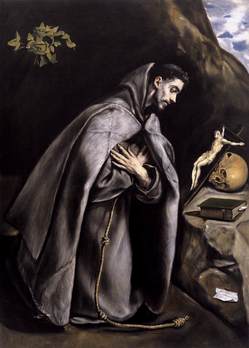 Preaching Jesus and His mercy,
Preaching Jesus and His mercy,Francis made the Cross his boast,
Loving Christ within the Manger,
Praised His presence in the Host.
God in mercy gave him brothers
Joined in poverty and grace,
Vowed to serve Christ in obedience,
Freed by chastity’s embrace.
What was hidden from the learned
To the simple has been giv’n:
To the child-like are revealed now
All the truths and joys of heav’n.
Preaching only Jesus’ Gospel,
Francis sang of endless care
Which God, author of creation,
With each person wants to share.
Most high God, all good and mighty,
Father, Son, and Spirit blest,
With Saint Francis we would love You
And with Christ-filled lives attest:
From You, Lord, comes our salvation!
As did Francis, help us live
Lives of peace and true devotion,
That we thanks and praise may give!
87 87 D, suggested tune: Nettleton
James Michael Thompson, (c) 2009, World Library Publications
Sonnet for Assisi
Blind Francis, waiting to welcome Sister Death,
Worn
though he was by ecstacies and fame,
Had heart for tune. With what remained of
breath,
He led his friars in canticles. Then came
Brother Elias, scowling, to
his side,
Small-souled Elias, crying by book and candle,
This was outrageous!
Had the friars no pride?
Music at deathbeds! Ah, the shame! the scandal!
Elias
gave him sermons and advice
Instead of song; which simply proves once more
What
things are sure this side of paradise:
Death, taxes, and the counsel of the
bore.
Though we outwit the tithe, make death our friend,
Bores we have with us
even to the end.
(Phyllis McGinley, 1950)
Saint Francis of Assisi
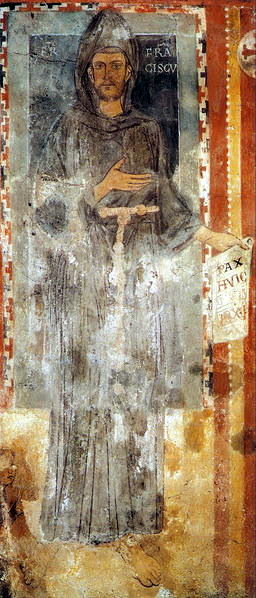 Let us rejoice in the Lord, and keep a festival in honor of blessed Francis. Let us join with the angels in joyful praise of the Son of God.
Let us rejoice in the Lord, and keep a festival in honor of blessed Francis. Let us join with the angels in joyful praise of the Son of God.
Working out the plan for the renewal of the priesthood
Below is an extract of a homily given by Franciscan Cardinal Claudio Hummer to new bishops at a gathering in Rome on 21 September 2009. The stage is set…
vocation and mission, above all by their own Bishop and by their community.
They wish to be recognised for that which they are and that which they do. They
also need to be assisted and guided to renew in their hearts the true identity
of the priesthood and the true meaning of celibacy. In this context, the
renewal and reinvigoration of their priestly spirituality will be decisive,
which has as its foundation in being true and unconditioned disciples of Jesus
Christ, who has configured them to Himself, Head and Shepherd of the Church.
For this discipleship, so determining of their lives, it will be of great help
for priests to listen and to pray aloud the Word of God, the daily celebration
of the Eucharist, the frequent use of the Sacrament of Confession, the
recitation of the Liturgy of the Hours, frequent visits to the Most Blessed
Sacrament, the recitation of the Holy Rosary and other means of spiritual
enrichment and of personal encounter and intimacy with Jesus Christ. Also of
great importance are the annual Spiritual Exercises and ongoing formation.
it is necessary to awaken the missionary consciousness of priests. The Church
knows there is a missionary urgency being experienced throughout the world, not
only ad gentes, but also within the very flock of the Church already
established for centuries in the Christian world. It is necessary to promote a
true missionary urge in our Dioceses and in our parishes. All our countries
have become a land of mission, in the strict sense. A new fire needs to be lit
in our priests and in us ourselves, a new passion to make us arise and go to
meet people where they live and work, to bring to them anew the Kerygma, the
first proclamation of the person of Jesus Christ, Crucified and Risen, and of
his Kingdom, to lead them to a personal and then a communitarian encounter with
the Lord. Our beloved Pope, Benedict XVI, referring to the situation in the lands
of age-old Christian tradition, has said, “We should give serious thought as to
how to achieve a true evangelization in this day and age […] It is not enough
for us to strive to preserve the existing flock” (Discourse to the German
Bishops, 21st August 2005), but we need a true mission. It is not enough merely
to welcome those who come to us, in the parish or in the parish house. There is
an urgent necessity to arise and go in search above all of the many baptised
who are distanced from participation in the life of our communities, and then
to seek also those who know little or nothing of Jesus Christ. The mission has
always renewed the Church. The same will also be true for priests when they go
into the mission. This, then, is a whole programme to develop during this Year
for Priests.
the Congregation for the Clergy
Blessed Columba Marmion
God, our Father, you called your servant, Columba, to the
monastic life. You bestowed on him the grace to understand the mysteries of
your Son and to make him known as the ideal for all who have been baptized.
Grant that we may learn from his example to live in Christ by opening our
hearts in joy to the Spirit of your Son, our Lord, who lives and reigns with
you and the Holy Spirit, One God, for ever and ever. Amen.
The Church observes
the feast of Blessed Columba Marmion today. He was an Irishman who became a monk in Belgium,
a diocesan priest who fell in love with the Benedictine way life, its emphasis on seeking God and who served as abbot. Dom Columba died on January
30, 1923. Marmion’s liturgical memorial, however, is observed not on his anniversary
of death but on the anniversary of receiving the abbatial blessing, October 3,
1909. At that time the first Sunday of October was the Solemnity of the Most Holy Rosary
of the Blessed Virgin Mary; in this era the feast of Our Lady of the Rosary is
observed on October 7th.
Two pieces to reflect up on…
The
whole of the Christian life consists in carrying Christ to birth within us and
in having Him live there’. This, of course is nothing more than a paraphrase of St. Paul’s
injunction in Gal. 4:19: ‘until Christ is formed in you’. For Marmion this is not just our
final goal, it is our daily, essential task: to form Christ within us, through the Graces of the
sacraments and our daily encounter with God in prayer. (Mark Tierney O.S.B,
“The Life and Times of Columba Marmion”)
And
… Revelation teaches us that there is
an ineffable paternity in God. God is a Father: that is the fundamental dogma
which all the others suppose, a magnificent dogma which leaves the reason
confounded, but ravishes faith with delight and transports holy souls. God is a
Father. Eternally, long before the created light rose upon the world, God
begets a Son to whom He communicates His nature, His perfections, His beatitude
His life, to beget is to communicate [By the gift of a similar nature ] being
and life. You are My Son this day have I begotten You [Ps 2:7; Heb 1:5; 5:5],
from the womb before the day – star, I begot you [Ps 110:3]. In God, then, is
life, life communicated by the Father … Creatures can only lisp when they
speak of such mysteries… the Father, and the Son, with one same and indivisible
Divine Nature, and both, although distinct from one another [on account of
their personal properties, ‘of being Father’ and ‘of being Son’] are united in
a powerful, substantial embrace of love, whence proceeds that Third Person, Whom
Revelation calls by a mysterious name: the Holy Ghost.
Such is as far as faith
can know it, the secret of the inmost life of God; the fullness and the
fruitfulness of this life are the source of the incommensurable bliss that the
ineffable Society of the three Divine Persons possesses.
And now God – not in
order to add to His plenitude, but by it to enrich other beings – exceeds, as
it were, His Paternity. God decrees to call creatures to share this Divine
life, so transcendent that God alone has the right to live it, this eternal
life communicated by the Father to the Only Son, and by them, to the Holy
Spirit … To these mere creatures God will give the condition and sweet name
of children. By nature, God has only one Son; by love, He wills to have an innumerable
multitude: that is the grace of supernatural Adoption. (Dom Columba Marmion,
OSB, Spiritual Writings. Ed. P.
Lethiellex. Maredesous Abbey, 1998.)
A very brief note on the canonization
process of Dom Columba can be read here.
